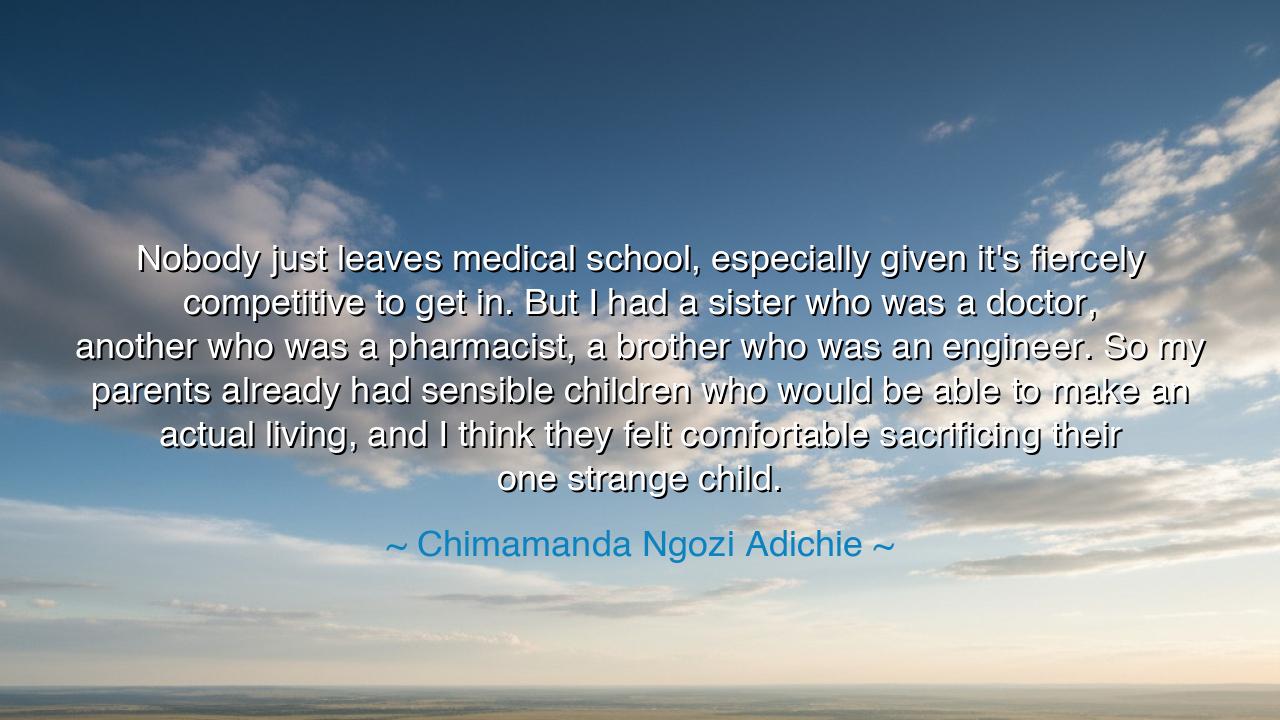
Nobody just leaves medical school, especially given it's fiercely
Nobody just leaves medical school, especially given it's fiercely competitive to get in. But I had a sister who was a doctor, another who was a pharmacist, a brother who was an engineer. So my parents already had sensible children who would be able to make an actual living, and I think they felt comfortable sacrificing their one strange child.






In the words of Chimamanda Ngozi Adichie, "Nobody just leaves medical school, especially given it's fiercely competitive to get in. But I had a sister who was a doctor, another who was a pharmacist, a brother who was an engineer. So my parents already had sensible children who would be able to make an actual living, and I think they felt comfortable sacrificing their one strange child." These words echo with the profound tension between duty and passion, between the expectations of society and the individual’s call to follow a different path. Adichie’s reflection is not just about her own story, but about the eternal struggle that many face in choosing between the secure, the practical, and the unconventional.
The ancient Greeks spoke of duty and honor as being central to one’s place in society. The philosopher Plato wrote of the ideal state, where each individual contributed according to their abilities, often in roles predetermined by their nature and talents. There was a respect for the structure of society, and many were expected to fit within the roles prescribed to them. The idea that one might choose a path that deviates from the societal norm was often seen as a challenge to the harmony of the state, as it could disrupt the balance that allowed the city-state to thrive. In this sense, Adichie’s experience is not just personal, but resonates with an ancient truth: the tension between individuality and society’s expectations has been a theme throughout history.
Consider the story of the Roman poet Ovid, who, like many before and after him, was caught between personal ambition and societal expectations. Ovid's desire to follow his own creative impulses led him to write Metamorphoses, a work that deviated from the traditional Roman literary canon. His work was so unconventional that it led to his exile from Rome by Emperor Augustus, who disapproved of Ovid's work and its perceived subversion of traditional Roman values. Just as Adichie felt like the "strange child" in her family, Ovid found himself isolated for choosing a path that was more aligned with his inner calling than with the pragmatic expectations of his society. This tension between individual desires and societal norms remains timeless.
Adichie's reflection also taps into a deeper question about the nature of success. Success has often been defined by the material achievements one accumulates—titles, careers, wealth, and status. In the eyes of her parents, her siblings' choice of careers in medicine and engineering offered the promise of stable livelihoods, the mark of "success" in the eyes of society. Yet, in choosing a different path—one that many might consider unconventional—Adichie aligns herself with another ancient tradition: that of the philosophers who sought not wealth, but wisdom, not status, but truth. The Socratic ideal of the examined life is not one where conformity reigns, but where the individual pursues their own truth, even if it defies convention. Adichie, by choosing the path of writing, has, in a sense, chosen the life of the philosopher over the life of the technician.
Her parents’ willingness to sacrifice their "strange child" for the sake of their other children’s more conventional success also highlights the ancient tension between sacrifice and individualism. The ancient Hebrews, in their stories, often discussed the burden of sacrifice, particularly in the figure of Abraham, who was asked to sacrifice his own son, Isaac, in obedience to divine will. This story, while grounded in faith, reflects a broader theme about the personal cost of following the greater good, or the expectations of others. Just as Adichie's parents may have made a sacrifice by allowing her to follow her own path, the ancients frequently spoke of the personal costs that accompany choosing a different way.
The lesson embedded in Adichie’s reflection is not just about following one’s passion at all costs, but understanding the balance between what we owe to ourselves and what we owe to our families and societies. Like Adichie, we may find ourselves in moments of tension between individuality and the demands of others. The ancients remind us that the path of individualism often comes at great cost but can lead to the highest form of fulfillment. Yet, it is not without sacrifice. The question for us is how we navigate that tension—how we make choices that honor both our inner desires and the expectations placed upon us.
In our own lives, let us take a moment to reflect on what we choose to sacrifice for the sake of following our true path. Whether it is a career in medicine, writing, or the arts, we must remember that each choice carries both a burden and a reward. The story of Chimamanda Ngozi Adichie is not just about the path of a writer; it is about the timeless struggle to find one's true calling in a world that often demands conformity. May we learn from her example and the wisdom of the ancients that, while sacrifice is inevitable, the pursuit of truth and passion is worth the cost. Let us choose wisely, and live with the courage to be true to ourselves.






AAdministratorAdministrator
Welcome, honored guests. Please leave a comment, we will respond soon